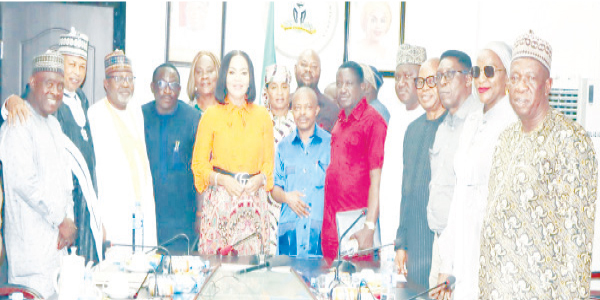The Trade Union Congress of Nigeria (TUC) has said it was never part of the process, meeting and declaration of embarking on street protest against the economic hardship slated by the Nigeria Labour Congress (NLC) for today and tomorrow.
The union further noted that NLC’s protest for economic hardship is not related to the initial 14-day ultimatum given to the Federal Government because of the non-implementation of the agreement on wage award, salary increase, CNG buses and others reached with government in October 2023.
TUC president, Festus Osifo, said this while addressing journalists in Abuja on some recommendations on what government should do to end the economic hardship and revive the country’s economy.
He said, “However, this protest that is being called by the NLC is not related to the ultimatum that we jointly gave. What we were told by NLC is that the protest is not related to the ultimatum that was given jointly.
“It is where you agree that you want to do something jointly that this is the way to go. And along the line, you decided that you are not doing again, that one will be talking about opting out. There was no initial agreement to embark on the protest. Whenever we are doing things together, you always see us coming together and addressing you.
“On that particular day the ultimatum for the protest was issued, did you see any member of TUC there? I know a lot of you have read the letter that was leaked. The letter was actually meant for NLC members, but it found its way to the press.
“I think the reasons were clearly stated so we were not part of the process. We were not part of the agreement ab initio, so, there is no need to opt out from it at all.
“Like I have said repeatedly that in trade union movement, you have a tool box, and in that toolbox, you have different tools that you could use in calling government to order. First of all you engage with what you think is superior information and that is what we have put together today. We will engage government with the solution points we listed here today. We will push government, discuss with them, have conversations with them, have meetings with them and proffer the solutions that we have put forward.”
The union listed its solution demands from government to include: “determination of real value of naira, new minimum wage, custom exchange rate for goods used in manufacturing, allegation that sub-nationals throw billions of dollars monthly into the parallel market, dollarisation of political party primaries and electioneering, clamp down on speculative trading in the foreign exchange market, patronising made-in-Nigeria goods, strengthening the economic management team, time to stop following the dictates of IMF and World Bank, effectively supervising the activities of banks, curbing crude oil theft and increasing investment in enhancing oil and gas production, curbing insecurity for farmers to return to farm, temporary importation of food from abroad, local refining of crude oil.”
Osifo added, “Some of these solutions are for immediate implementation. Some are for medium term implementation, while others are for long term. That means some of them may not be implemented in one year but we believe that those ones that can be implemented immediately should be done. We believe that if government goes ahead to do those things, most of the problems that we are facing today will ease off.
“Look at what we wrote there as number one. We are not proffering solutions that are not practicable. It is a solution that is feasible, a solution that is possible. If the number one alone is implemented, I can tell you that the high cost of living we are facing today will reduce.”
On the issue of the earlier 14 days ultimatum it jointly gave the Federal Government, the TUC president, said, “The reason we gave that ultimatum was because government signed an agreement with us on October 2. When we look at that agreement, it was worrisome that nothing has been implemented. In fact, they paid a wage award just once, for September.
“We looked at that document, there are low hanging fruits and the wage award was the least thing that government should do. Visitation to refinery was also there in that agreement. But as at when we issued the 14 days ultimatum, government was not even ready to take also the refinery. So we are now wondering, are they just giving us stories that are not right, that we need to find out what is happening.
“That was why we served an ultimatum jointly. Normally when you serve ultimatum, you give like 14 days or one month. If the person you served the ultimatum just goes to sleep and says whatever. Then it will embolden you to say these people are calling our bluff. Then we need to call them to order. But when you serve an ultimatum, the review of that ultimatum is supposed to be like two or three days to the end of that ultimatum. It is not four or five days after you give ultimatum, you still have like some days more.
“So when we issued that ultimatum, government invited us, we started engaging and we told them the quick wins that must be achieved if you want us not to go on strike. The ultimatum was served on Thursday and a meeting was held on Monday.
“When we had that meeting, we went through everything and we told them you have not done this, you have not done that. They said okay, fine; that they are going to act. Remember before the ultimatum was given, one month wage award was paid, September. But as we speak today, before the expiration of that ultimatum they paid four months addition.
“Remember we had challenge with RTEAN. We went to Lagos, we protested and it was part of the agreement with the government. But as we speak within the life of that ultimatum, the RTEAN issue has been completely resolved. Then visitation to refinery, within the life of the ultimatum also, government fixed a date and we have visited the refinery. We also said the money you owe ASUU you must pay and as at today, we have also learnt that they have paid four months. We gave ultimatum earlier because we didn’t see any level of demonstrations but as at today they have started doing some work on the agreements.”






